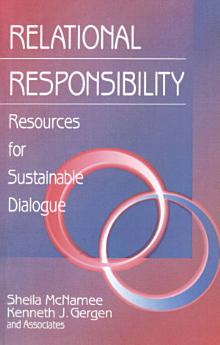Relational Responsibility: Resources for Sustainable Dialogue
About this ebook
About the author
Sheila McNamee, Ph.D. is Professor Emerita of Communication at the University of New Hampshire and Vice President and Co-Founder of the Taos Institute. She is internationally known for her contributions to social construction theory and practice, focusing on dialogic transformation in psychotherapy, education, healthcare, organizations, and research. She is author of several books and articles, including Research and Social Change: A Relational Constructionist Approach (with D. M. Hosking, Routledge, 2012), Relational Responsibility: Resources for Sustainable Dialogue (with K. Gergen, Sage, 1999), and is co-editor of The Sage Handbook of Social Constructionist Practice (with M. Gergen, E. Rasera, & C. Camargo-Borges, 2020) and Education as Social Construction: Contributions to Theory, Research, and Practice (with T. Dragonas, K. Gergen, E. Tseliou, Taos WorldShare, 2015).
Kenneth J. Gergen is a Senior Research Professor in Psychology at Swarthmore College, and the President of the Taos Institute. He is internationally known for his contributions to social constructionist theory, technology and cultural change, the self, aging, education, and relational theory and practices. His major writings include, Realities and Relationships: Soundings in Social Construction, The Saturated Self: Dilemmas of Identity in Contemporary Life, and Relational Being: Beyond Self and Community. His most recent work Beyond the Tyranny of Testing: Relational Evaluation in Education (with Scherto Gill) offers a relational constructionist alternative to the destructive practices of testing and grading in education. Gergen lectures throughout the world, and has received numerous awards for his work, including honorary degrees in both the U.S. and Europe.







